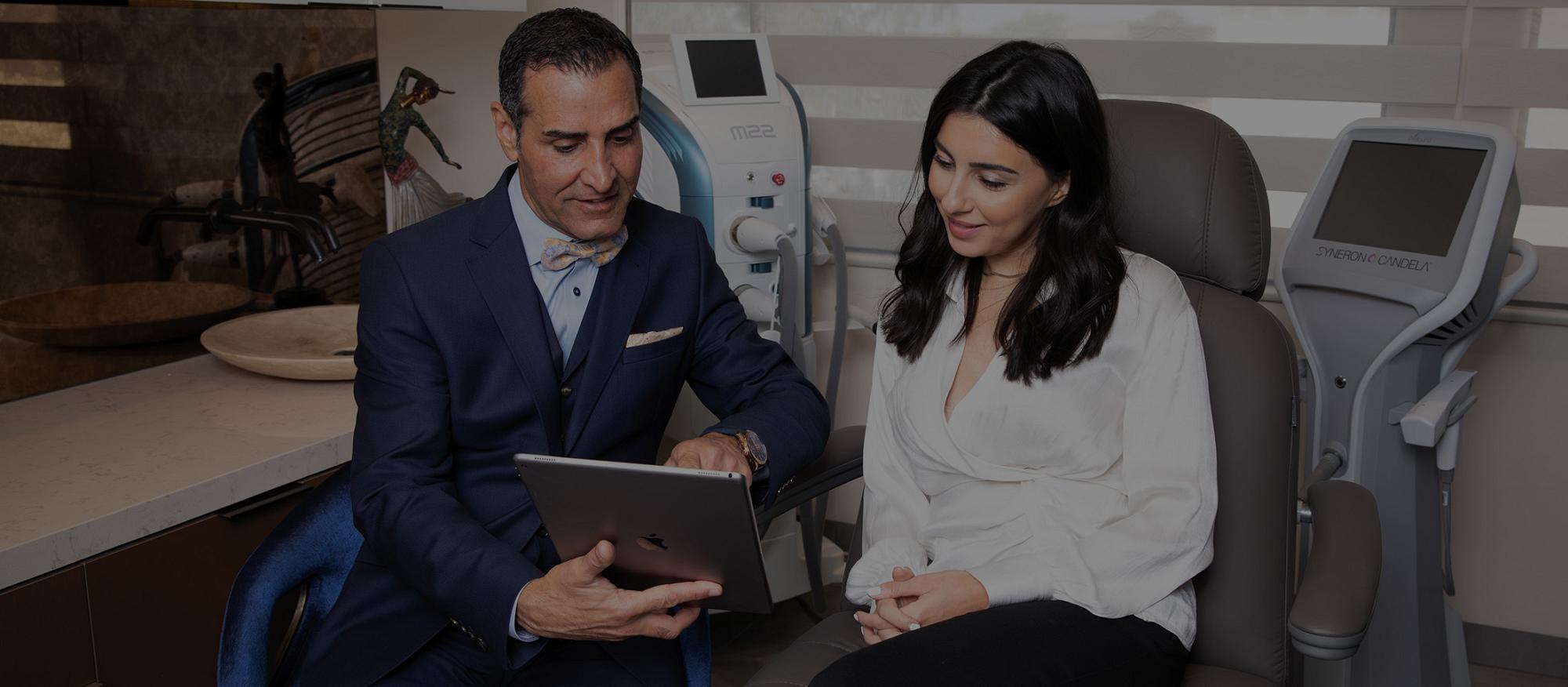

















When it comes to neurotoxins for facial rejuvenation, it is clear that Botox® is the most notorious; however, alternatives are available. One alternative is Dysport®. Just like Botox, Dysport is a neurotoxin designed to limit muscle movements in treated areas. Limiting muscle movements in certain areas of the face decreases the appearance of the lines and wrinkles that form when the muscles contract. So, the question is, what is the difference between Botox and Dysport? Let's find out.
Dysport vs Botox: What is the Difference?
The wrinkles frequently treated with neurotoxins are those created by the muscles in the forehead, near the mouth (frown lines) and the eyes (crow's feet).
Dysport is also used to lift the eyebrows, reduce the number of lines in the neck, raise the corners of the mouth, reduce chin dimpling and relax the jaw muscles as a means to slim the face.
The results achieved with Dysport and Botox typically last up to 4 months. However, since each patient is unique, it is not uncommon for a patient to find that one product will last longer for them than the other one will.
How Soon After Injection Does a Neurotoxin Start to Work?
Upon injection, the nerve endings near the areas treated with the Botox or Dysport will begin absorbing the neurotoxin. Once the product is absorbed, it blocks the release of the transmitters that are necessary to communicate with the muscles and tell them to contract. With Dysport, most patients see improvement within 2 to 3 days of treatment. However, the results achieved with Botox tend to take a little longer and are not visible for at least 3 days after injection. For Botox and Dysport, the full effect is reached within 2 to 3 weeks of the procedure.
Product Effectiveness and Final Results
Once the full effect of Botox or Dysport is achieved, the results attained are comparable: Both of these products are successful in reducing the wrinkles that are caused by muscle movements.
Number of Units to Achieve Similar Results
To achieve equally effective final results, Dysport requires more units than Botox does.
Feathering
Whereas Botox usually remains at the point of injection, Dysport tends to gradually taper off as it moves away from the injection point. This characteristic can be good or bad. For example, if one of the muscles being treated is near another muscle that does not require treatment, the product could spread and affect both muscles. While the spread of medicine to nearby muscles is possible with both Dysport and Botox, it seems more likely with Dysport.
The Drawbacks of Feathering
Feathering: Areas of Concern
The Outer Corner of the Eye
One of the areas where feathering could be of concern is at the outer corner of the eye. When using Dysport to address crow's feet, the lower aspect of the application area is fairly close to the upper portion of a muscle that is necessary to smile. So, if too much of Dysport is injected and it feathers into this area, the patient's smile will be crooked until the effects of the neurotoxin wear off in approximately 4 months: This is just one of the reasons that choosing an experienced, expert injector is so important.
The Chin
When treating the chin, the goal is to reduce the amount of dimpling as well as lift the corners of the patient's mouth. Precision when administering Dysport and Botox is essential. If the medication drifts when treating the chin or the mouth, the patient's ability to speak and smile will be affected.
The Benefits of Feathering
When the medicine feathers, it can provide the patient with a more natural appearance. This natural appearance is achieved as the medicine spreads to the outer edges of the treated area. This allows the treated and untreated areas to blend nicely. Two of the issues that feathering can be particularly helpful with addressing are forehead lines and crow's feet.
Feathering Reduces the Likelihood of an Obvious Separation
It is possible to create a naturally-looking result with Botox; however, it requires administering small amounts of medicine around the edges of the area being treated to help blend the treated and untreated areas. If this is not done, an obvious separation is likely. On the other hand, since one of the main characteristics of Dysport is feathering, the chances of a visible separation between the treated and untreated areas are reduced.
A ‘Boxy-Looking’ Forehead
Sometimes, Botox creates an obvious separation between the treated and untreated areas in the forehead, causing it to appear ‘boxy.’ This problem is evident when the patient lifts his or her eyebrows to wrinkle their forehead: The center section of the patient's forehead will appear smooth, but the areas surrounding it will still have wrinkles. This makes it obvious which areas were treated and which areas were not, causing the treated area in the center of the forehead to resemble a rectangular box. This result is unlikely with Dysport.
Addressing Crow's Feet
Just as with the forehead, to attain a natural-looking result with Botox, blending between the upper cheek and the bottom of the crow's feet is critical. If this issue is not addressed, the transition from treated to untreated will be obvious especially when the patient smiles.
With Dysport, its feathering effect will automatically blend the treated and untreated areas together. However, to accomplish the same result with Botox, it must be administered in very small amounts around the treated areas.
Cost
In general, the total cost for an identical procedure with either Botox or Dysport is about the same.
Botox vs Dysport: Too Close to Call
There is no clear winner when it comes to the battle between Botox and Dysport. As an expert injector, Dr. Kevin Sadati uses both of these products to address the signs of aging. However, he takes many factors into consideration as he determines which of these products will provide his patient with optimal results.
If you are interested in learning more about the non-surgical facial rejuvenation procedures available in Orange County, contact us today at 949-438-2633 to schedule your initial Newport Beach plastic surgery consultation with Dr. Kevin Sadati. Dr. Sadati is one of the top plastic surgeons in Orange County, he is an expert injector and board-certified plastic surgeon specializing in cosmetic procedures and facial reconstruction surgery.
We are located at:
359 San Miguel Drive, Suite 110
Newport Beach, California 92660

359 San Miguel Dr, Suite 200, Newport Beach, CA 92660
Clients from around the globe travel to see Dr. Sadati for his surgical expertise. He and his surgical team provide the highest standard of patient care, from the initial consultation, to complete recovery and conclusion of your care. Our friendly staff is available to accommodate you in any way that we can.
What procedure are you interested in?
359 San Miguel Dr, Suite 200, Newport Beach, CA 92660
What procedure are you interested in?